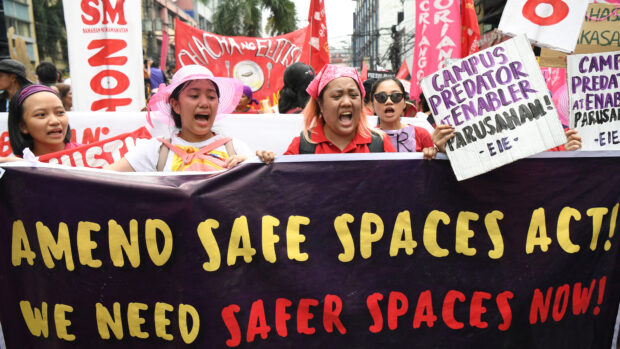
Women activists carrying placards shout slogans during a protest march to the Malacanang Palace to mark International Women’s Day in Manila on March 8, 2024. (AFP)
MANILA, Philippines – In time for International Women’s Day, the United Nations Population Fund (UNFPA) on Friday urged the Philippines to step up efforts to address violence against women and promote gender equality.
Dr. Leila Joudane, UNFPA Philippines Country Representative, said the country needs to make significant progress to achieve the Sustainable Development Goals (SDGs) by 2030, particularly the goal on gender equality.
“We at the UNFPA are especially concerned with the elimination of all forms of gender-based violence and harmful practices against women and girls,” Joudane said in a statement.
She cited the 2022 Philippine National Demographic and Health Survey, which showed that 18 percent of Filipino women who had a husband or intimate partner experienced physical, sexual or emotional violence.
“And of those who experienced gender-based violence, two out of five did not seek help,” Joudane said.
She emphasized the importance of quality survivor-centered services and echoed the Convention on the Elimination of All Forms of Discrimination against Women’s (CEDAW) call for their legislation.
Joudane also highlighted the need for ensuring universal access to sexual and reproductive health and reproductive rights (SRHR).
“We are hopeful that the country will soon pass into law the Adolescent Pregnancy Bill, which guarantees access to reproductive health services for adolescents without parental consent under specific circumstances,” she said.
The bill, according to Joudane, would establish a National Action Plan to help reduce adolescent pregnancy rates.
“Fulfilling SRHR is crucial for achieving gender equality,” Joudane stressed. “It dismantles power structures that perpetuate inequality and improves women’s health.”
Data suggests the Philippines could gain $18 in return through “healthcare savings and socio-economic gains” if it invests in SRHR, Joudane said.
“Including women in the conversation and decision-making isn’t just about achieving equality; it’s about creating a more inclusive and empowering environment for everyone. When we invest in women, especially those marginalized, we invest in a brighter future for everyone,” she concluded.